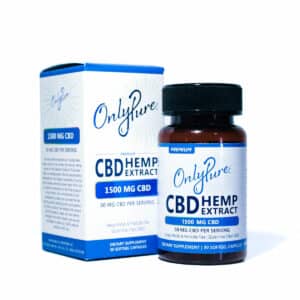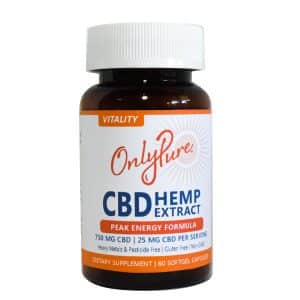All cannabis plants contain multiple therapeutic compounds called cannabinoids. These 113 compounds activate the natural cannabinoid receptors in our bodies—also known as the endocannabinoid system (ECS)—to produce beneficial effects.
When most people discuss the entourage effect, they discuss its impact related to THC products. However, there are instances when CBD can also provide these therapeutic benefits. By understanding this relatively new discovery of how cannabinoids benefit the body, you can maximize the advantages of CBD.
What is the Entourage Effect?
The entourage effect is a concept in pharmacology and cannabis research that suggests the compounds present in the cannabis plant work together synergistically to produce a combined effect that is greater than the sum of their individual effects when used in isolation. This idea is particularly relevant in the context of cannabinoids, such as THC (tetrahydrocannabinol) and CBD (cannabidiol), as well as other lesser-known compounds like terpenes and flavonoids, which are also present in cannabis.
In simpler terms, the entourage effect proposes that the various components of the cannabis plant, including cannabinoids and other chemical compounds, interact with each other to enhance or modify the overall therapeutic effects of the plant. For example, while THC may produce certain effects on its own, when combined with CBD and other compounds found in the plant, the overall effect may be different and potentially more beneficial.
What Compounts Contribute to the Entourage Effect?
Several compounds contribute to the entourage effect in cannabis, working together synergistically to enhance the overall therapeutic effects.
These compounds include:
- Cannabinoids: Cannabinoids are chemical compounds found in the cannabis plant. The two most well-known cannabinoids are THC (tetrahydrocannabinol) and CBD (cannabidiol), but there are over 100 cannabinoids identified in cannabis. Other cannabinoids, such as CBG (cannabigerol), CBC (cannabichromene), and CBN (cannabinol), also contribute to the entourage effect.
- Terpenes: Terpenes are aromatic compounds found in many plants, including cannabis. They give each cannabis strain its unique aroma and flavor profile. Terpenes like myrcene, limonene, pinene, and linalool are prevalent in cannabis and are believed to have therapeutic properties. Terpenes can also influence the effects of cannabinoids and contribute to the entourage effect.
- Flavonoids: Flavonoids are a group of phytonutrients found in fruits, vegetables, and other plants, including cannabis. Flavonoids in cannabis, such as cannflavin A and cannflavin B, have demonstrated anti-inflammatory and antioxidant properties. Like terpenes, flavonoids may interact with cannabinoids to enhance therapeutic effects and contribute to the entourage effect.
- Fatty acids and other compounds: Cannabis also contains fatty acids, amino acids, and other phytochemicals that may contribute to the entourage effect. These compounds may have their own therapeutic benefits and interact with cannabinoids, terpenes, and flavonoids to enhance the overall effects of cannabis.
Researchers continue to study these interactions to better understand how different compounds work together and how they can be utilized for therapeutic purposes.
Does the Type of CBD Matter With the Entourage Effect?
CBD (cannabidiol) is just one of the many cannabinoids found in the cannabis plant, and it interacts with other cannabinoids, terpenes, flavonoids, and compounds to create the entourage effect. However, because some forms of CBD are derived differently than others, the entourage can vary (or not occur at all) depending on the specifics.
There are three main types of CBD: full-spectrum, broad-spectrum, or isolate.
Full-Spectrum CBD vs. CBD Isolate
CBD isolate extracts have been through several extraction and cleaning processes to ensure the final product is 99% pure CBD. Many companies do this because it’s easier for them to achieve accurate concentrations of CBD, which means labeling the packaging with the correct information is quicker and easier.
Isolating the CBD also means that companies can guarantee their extract is free from THC—the main psychoactive cannabinoid which is responsible for the “high” that many people associate with marijuana use. However, this removes all other cannabinoids as well, meaning the entourage effect would not be applicable.
Most people using CBD for specific medicinal purposes believe they receive the most benefits from a full-spectrum CBD since it contains other cannabinoids and terpenes.
For those who still wish to avoid consuming THC altogether but want to take advantage of the entourage effect, there is a third class of extract available: broad-spectrum CBD. This is an isolate extract which has had other isolates added back into it in order to broaden the range of its profile. For example, a manufacturer will isolate CBD and then mix it with isolated CBC, CBG, CBN, and various other cannabinoids and terpenes, while leaving out the THC.
While the addition of other isolated compounds certainly enhances the effects of CBD, it’s not quite the same level of synergy provided by a full-spectrum extract. Broad-spectrum products, therefore, sit somewhere between isolates and full-spectrum extracts.
OnlyPure Full-Spectrum CBD: Offering The Entourage Effect
At OnlyPure, we believe in quality and maximizing the health benefits of CBD. That’s why all OnlyPure™ CBD products are full-spectrum hemp distillate, which contains dozens of wonderful cannabinoids, including CBG, CBDA, CBC, CBD, and less than .3% THC. With the help of these cannabinoids and other ingredients in our full-spectrum CBD, you can receive the benefits of the entourage effect every time you use anything in our online store.





